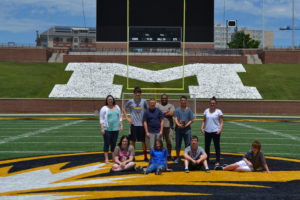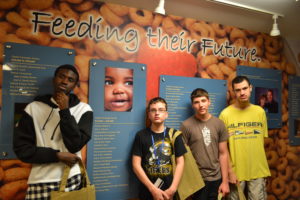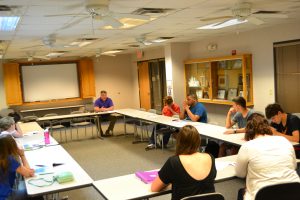
Through partnership with the Missouri Division of Vocational Rehabilitation (VR), the Life & Work Connections program this summer offered pre-employment transition services to high school students who see work in their futures. The program called “Work It” combines classroom learning with community outings, providing participants with an early start at job preparation and exploration.
Sixteen-year-old Gregory (standing second from the right in the photo below) feels the experience was well worth his while. “This class makes me feel ready to find a job,” he says. “My next goal is to find a job. I liked going to MU and learning about jobs.”

Gregory is referring to a field trip at the Mizzou Athletic Training Complex, whose human resources department is recognized for its inclusive hiring practices. Participants were exposed to various departments in the facility and had the opportunity to interact with Mizzou staff.
Sixteen-year old Jeffrey (pictured on the left in the photo to the left) says, “The class is helpful – I feel like I know how to find a job. I know what to do on the job and what not to do on the job.”
This summer, 13 students are participating in the program. Funding for the Work It! experience comes primarily from Division of Vocational Rehabilitation Employment grant funds. Participants between ages 16-21 (nine of the 13 this summer) are in the eligible VR target group.
While the Life & Work Connections program has been offering Work It! classes for several years as one of its Transition Network offerings, this is the first year in partnership with VR. In keeping with VR’s expectations, instructors Mary Breight and Rachel Murphy are charged with covering five pre-employment transition service activities with participants this summer, including:
- Job Exploration Counseling
- Work-Based Learning Experiences
- Counseling for Post-Secondary Education
- Workplace Readiness Training
- Instruction in Self Advocacy/Peer Mentoring.
VR’s stated intent is to “assist students with disabilities in making the transition from secondary to post-secondary education/training and competitive, integrated employment.”
Some of the participants also get hands-on work experience with the Life & Work Connections landscape and janitorial crews. The work crews offer opportunities for Work It! participants to augment their learning while earning wages for their time on the clock.

“Teaching this class has been an amazing experience,” says instructor Mary. “I have seen students begin to open up with each other, form connections, and tie the curriculum to their personal lives and experiences. The curriculum has challenged the students to ‘think outside of the box’ and inspired many in depth class discussions. It has been an honor working with the students and seeing them grow over a period of eight short weeks.”
We know that more people with disabilities post high school are unemployed and live in poverty than any single demographic group in the United States today. We also know that students, regardless of disability status, are more likely to have successful employment outcomes post high school if they had some exposure to the work place and employment experience while still in school. Federal regulations such as the recently introduced Workforce Innovation and Opportunity Act place new emphasis on transition services for youth with disabilities. We, along with sister agencies in our community, the Division of Vocational Rehabilitation, and the Department of Mental Health, continue to seek opportunities for innovation and collaboration toward improving employment odds for students with disabilities. Work It! is an example of that effort, and one we hope to repeat every summer.